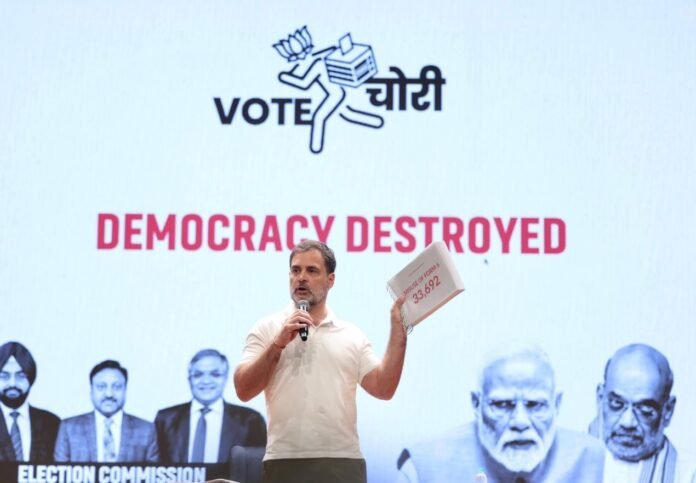Senior Congress leader and Leader of the Opposition in Lok Sabha, Rahul Gandhi, has leveled serious allegations of large-scale voter fraud during the 2024 Lok Sabha elections, particularly targeting one assembly segment in Karnataka. At a high-stakes press conference, Mr. Gandhi claimed that a detailed internal investigation by the Congress party uncovered substantial manipulation in the Mahadevapura Assembly segment, which forms part of the Bangalore Central Lok Sabha seat. According to Gandhi, the findings raise deep concerns about the integrity of the electoral process and the role of the Election Commission, which he accused of acting in collusion with the ruling BJP to “steal” the elections. These explosive allegations have triggered sharp responses from both the Election Commission and the Bharatiya Janata Party (BJP), igniting a fresh political controversy just months after the general elections.
Rahul Gandhi pointed out that while Congress expected to win 16 Lok Sabha seats in Karnataka, based on internal assessments, they secured only 9. In the analysis of seven unexpected losses, the Congress focused specifically on Mahadevapura. In this constituency, Congress secured 1,15,586 votes, whereas BJP received 2,29,632 votes—a key factor that tipped the scales in favor of the BJP in Bangalore Central, where the final margin was 32,707 votes. Gandhi claimed the Congress unearthed 1,00,250 “stolen” votes cast through five manipulative methods: duplicate voter entries, fake or invalid addresses, repeated names across multiple states, bulk voters listed at a single address, and voter IDs with either indistinct or micro-sized photographs.
Highlighting discrepancies, Gandhi said many addresses listed in the voter rolls did not exist, and in several instances, dozens of voters were registered at the same address, which upon verification, turned out to be occupied by just one family. He also alleged misuse of Form 6, which is intended for first-time voters, to manipulate the voter database. He emphasized that when the party tried to verify voter lists, the Election Commission refused to provide digital rolls, further intensifying suspicion.
Turning his attention to the wider electoral process, Rahul Gandhi cited inconsistencies in voter behavior across states. He questioned how the INDIA bloc performed strongly in the Lok Sabha elections in Maharashtra, winning 30 out of 48 seats, but failed to make a mark in the state Assembly polls just five months later. He noted that over one crore new voters cast ballots in the Assembly elections, a figure he said raised eyebrows given that more voters were added in five months than in the previous five years. According to him, reports from booth agents contradicted the Commission’s claim of brisk voting, and Gandhi pointed to similar irregular patterns in Haryana and Madhya Pradesh, suggesting a coordinated effort to influence electoral outcomes.
Accusing the Election Commission of becoming partisan, Gandhi said the poll body was no longer serving as an impartial umpire but was actively participating in dismantling the very democracy it was supposed to protect. He called for the judiciary to intervene, asserting that democratic principles were under threat.
The Election Commission responded by challenging Mr. Gandhi to submit a formal oath under Rule 20 of the Registration of Electors Rules, 1960, listing names and part numbers for those he alleged were fraudulently included or excluded. The Karnataka Chief Electoral Officer demanded that Gandhi submit the declaration by the evening, warning that making false claims about electoral rolls is punishable under Section 31 of the Representation of the People Act, 1950, and Section 227 of the Bhartiya Nyaya Samhita, 2023. The declaration also required Gandhi to confirm whether he was a voter in the said constituency and that he was making the statement with personal knowledge.
While the BJP dismissed Gandhi’s charges as “baseless” and accused him of losing composure after electoral setbacks, the controversy continues to stir debate nationwide. With the spotlight now on both the Election Commission and judiciary, political observers await the next move in what could become a defining chapter in India’s democratic process.
This news report has been compiled based on information available from web media and international news websites




